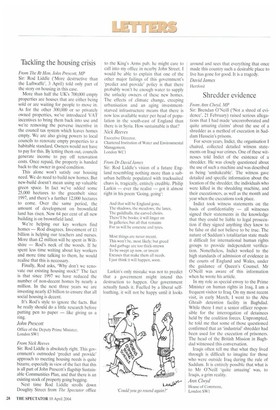Shredder evidence
From Ann Clwyd, MP Sir: Brendan O'Neill (Not a shred of evidence', 21 February) raised serious allegations that I had made 'uncorroborated and quite amazing claims' about the use of a shredder as a method of execution in Saddam Hussein's prisons.
For seven years, Indict, the organisation I chaired, collected detailed witness statements on Iraqi war crimes. One of these witnesses told Indict of the existence of a shredder. He was closely questioned about the use of such a machine and was described as being 'unshakeable'. The witness gave detailed and specific information about the location of the shredder, the individuals who were killed in the shredding machine, and their executioners, as well as the month and year when the executions took place.
Indict took witness statements on the basis of confidentiality — all witnesses signed their statements in the knowledge that they could be liable to legal prosecution if they signed anything they knew to be false or did not believe to be true. The nature of Saddam's totalitarian state made it difficult for international human rights groups to provide independent verification. Nonetheless, Indict worked to the high standards of admission of evidence in the courts of England and Wales, under the guidance of Queen's Counsel. Mr O'Neill was aware of this information when he wrote his article.
In my role as special envoy to the Prime Minister on human rights in Iraq, I am a frequent visitor to Iraq. On my most recent visit, in early March, I went to the Abu Ghraib detention facility in Baghdad. While there I met a senior officer responsible for the interrogation of detainees held by the coalition forces. Unprompted, he told me that some of those questioned confirmed that an 'industrial' shredder had been used for the execution of prisoners. The head of the British Mission in Baghdad witnessed this conversation.
Iraqis often tell me that what they lived through is difficult to imagine for those who were outside Iraq during the rule of Saddam. It is entirely possible that what is to Mr O'Neill 'quite amazing' was, to Iraqis, a grim reality.
Ann Ch4yd
House of Commons, London SW1


































































 Previous page
Previous page